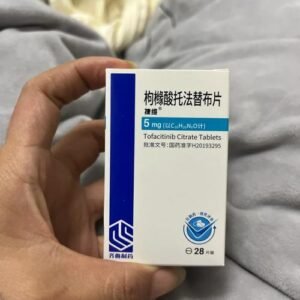Pimitespib Jeselhy、匹米替比
Indications: Gastrointestinal stromal tumors (GISTs) that progress after chemotherapy.
Target: CSF-1R
Main ingredient: Pimitespib
Dosage form: Tablets
Specifications: 40 mg x 40 tablets
Intended population: Patients with GISTs that progress after chemotherapy.
Appearance: White film-coated tablets, debossed with the number “40” on the front and “P115” on the back.
Dosage and Administration: The adult dose is 160 mg of Pimitespib taken orally once daily for 5 consecutive days, fasting. The dose should be discontinued for 2 days, and then repeated after 2 days. The Pimitespib dose may be reduced based on the patient’s clinical response.
Adverse Reactions: The most commonly reported adverse reactions with Pimitespib include diarrhea, ocular symptoms, bleeding, taste changes, loss of appetite, nausea, and vomiting.
Precautions: Cmax and AUC are increased when this medication is taken after a meal. To avoid food effects, patients should avoid taking this medication between one hour before and two hours after meals… [Details]
Use in Special Populations
[Pregnant Women] Pimetib is not recommended for use in pregnant women or women who may become pregnant.
[Lactating Women] Components in Pimetib may be transferred into breast milk and may cause serious side effects in the infant after breastfeeding. Breastfeeding should be avoided while taking this medication.
[Women and Men of Reproductive Potential] Women of reproductive potential may experience decreased reproductive function. Men should use contraception during and for four months after taking this medication.
[Pediatric Use] Pimetib may affect bone growth; avoid using this medication in children.
[Renal Impairment] Clinical studies have not been conducted in patients with renal impairment. No dose adjustment is required for patients with renal impairment.
[Hepatic Impairment] Pimetib is primarily metabolized in the liver, so blood concentrations may be elevated. No dose adjustment is required for patients with mild hepatic impairment. Because there is no safety information for pimetribuzinib in patients with moderate or severe hepatic impairment, caution is advised when using pimetribuzinib in patients with moderate or severe hepatic impairment.
Contraindications
Not yet established.
Drug Interactions
In simulations based on physiologically based pharmacokinetic models, the exposure of midazolam and metformin (a substrate of MATE1 and MATE2-K) may be increased with coadministration of pimetribuzinib compared to administration of midazolam (a CYP3A substrate) and metformin (a substrate of MATE1 and MATE2-K) alone.
Share:
Products
Our offers
Health Classification
Let us work together to protect precious health




























